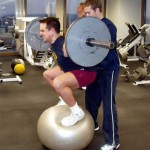Find the Fib
September 4, 2009 by GradingGirl
Filed under Mini-Lessons, Writing Practice
People usually love to write about themselves. Writing can be therapeutic, it can be a chance to express oneself more openly than one may in person, and it can provide a creative channel to explore. Here’s an assignment my seniors run with time and again:
Find the Fib* 
Below you will find five statements about me. Four of the statements are true, one is a fib. Can you guess which one is the fib?
1. My voice is the voice of two characters on a pinball game.
2. I worked as a runway model.
3. I was interviewed and appeared on a national television show to give my opinion about one of the past season’s American Idol contestants.
4. Teri Hatcher is my third cousin on my mother’s side.
5. I hang glided 1400 feet in the air, and later jumped off 100 ft cliff.
Now it’s your turn!
a. Type five statements about yourself. (think of your accomplishments, accidents, travels, mishaps, etc) Four statements must be true and one statement must be a fib.
2. Print a copy of your statements. Go to as many classmates as possible. You must go to at least ten people, but the more the better. Keep track of how many people can spot your fib and how many cannot. Tell me your results here: _____ # of people you fool _____ # of people who correctly guess your fib The person with the fewest correctly guessed fibs will be officially titled the “Best Fibber” of the Class of 2010!!!
3. Now . . . choose one of your true statements to elaborate on. Your assignment is to tell the story of this statement in writing! (minimum one well-developed paragraph)
*adapted from Kelly Gallagher’s Teaching Adolescent Writers
btw – the fib is #4! 🙂
Advise the Adviser
September 1, 2009 by GradingGirl
Filed under Grammar, Mini-Lessons
Adviser or Advisor???
AP style tells us to use adviser rather than advisor but it does not indicate why. I am interested in learning the reason. Perhaps it has to do with the etymology of the word.
Maybe because the root verb (“advise”) ends in the letter E, the -er suffix is preferred to the -or suffix. An analogous case is the verb organize, which becomes organizer (and clearly not “organizor”).
Dictionaries say these words are synonymous. Neither seem technically incorrect or correct.
What do you think? Comment back – do you use advisor or adviser?
Are you hoping or hopeful?
August 11, 2009 by GradingGirl
Filed under Grammar, Mini-Lessons
Being hopeful is a good thing. It is always better to see the glass half full than half empty. Overusing the word hopefully, on the other hand, is not such a good thing.
Hope vs. Hopefully
The word hopefully is an adverb. An adverb is a word that describes a verb, so hopefully is a word that describes how something is done. Polly Pocket skipped hopefully down the grassy path means that Polly Pocket skipped in a hopeful manner down the path; it describes the way in which she skipped. It’s an active process; in other words, it’s something that we can control.
The adverb hopefully, then, should not be used synonymously with the phrase I hope since hope means a wish or a desire. Hopefully, he will win the race is incorrect. I hope he wins the race is the correct way to phrase that. When we hope, the outcome is out of our control. In other words, it’s a very passive act, and using hopefully for I hope is a grammar error. And why would we want to be passive and incorrect at the same time?
There is absolutely nothing wrong with hoping; however, we always have more success when we actively pursue things than we do when we wish for the best. So GG’s advice is to be active and decide to use these words correctly. 🙂
You Guys Can’t Be With Yous Guys
August 4, 2009 by GradingGirl
Filed under Grammar, Mini-Lessons
A follower just asked me if “yous guys” is proper English. This is a great question, considering the amount of colloquial language thrown around carelessly every day. As the school year creeps upon us, now is the perfect time to clean up our communication skills.
You Guys vs. Yous Guys
Let’s set the record straight away: Yous guys is improper English. Do not say it, do not write it, and do not even think it. The extra ‘s’ is mistakingly added by those who believe there is a plural form of ‘you.’ Unlike numerous other languages, English does not have a plural form of you. (Incidentally, this is the same mistake made when speaking the phrase ‘y’all.’ Again, there is no need to pluralize you with the word ‘all.’ ‘You’ is the pronoun that refers to one person or to a number of people. The form never changes.) If you must use this colloquial phrase, use you guys.
Grading Girl actually doesn’t like to use the phrase at all. It sounds colloquial and lowers the speaking level. You guys is commonly used to address multiple people at once. The person speaking the phrase is often angry and upset. The individual often does not know whom or where to direct his/her anger or lecture so the individual directs it at an often innocent, larger audience. This is commonly heard in the workplace where one tries to curtail his/her frustrations while maintaining anonymity.
GG’s bottom line: Try to avoid you guys because of its colloquial connotation but never use yous guys because of its improper form of you.
Thank you to my follower, Lori Lewis, for the question. Keep the grammar questions coming, GG readers. I post a mini-lesson every Tuesday for TeacherTuesday on Twitter!
Is it Worse to Say Worst?
July 28, 2009 by GradingGirl
Filed under Grammar, Mini-Lessons
I could write 1,000 mini-lessons and still not cover all of the confusing words in the English language.
Worse vs. Worst
Worse is a comparative. Use it when comparing two things, just like better only in the negative instead of the positive. This means when comparing two things, one will always be “worse” and not “worst” than the other.
Example: Cardio is worse than strength training because it takes longer.
Worst is a superlative. Think of worst like best, only in the negative. When something is much more terrible than multiple items, it is the “worst” of them all.
Example: The worst idea is to attempt to lift heavy weights while balancing on a ball.
GG says there may be worst things you could do, but it is worse to not speak at all than to speak incorrectly.
News Flash – No One Can Eat Healthy!
July 23, 2009 by GradingGirl
Filed under Grammar, Mini-Lessons
A couple of months ago, my brother brought up the question as to the difference between healthy and healthful. I was on vacation visiting at the time and put it in the back of my mind to think about later. Writing my most recent post about my favorite snack made me recall that question. I’m always up for a healthful debate, so here goes:

Are these foods healthy or healthful?!?
Healthful vs. Healthy
According to the Merriam Webster’s Dictionary, the word healthful means “beneficial to health of body or mind” or contributing to good health. Healthy means “enjoying the state of good health” or being free of disease.
If we go by these definitions, it makes sense that things are healthful and people are healthy. Right? That would mean that all those eat clean diets out there are not healthy. That would also mean that we can’t eat healthy. Before you go digging into that ice cream, know this. We can eat healthful diets. And, yes, we can engage in healthful eating. We will be more healthy because of it. As with many words in our English language, there’s a tricky little inconsistency to keep in mind: if we are describing food as free of disease, we can refer to it as healthy. Otherwise, food that is conducive to health is healthful food.
Some have written off the use of the word healthful as trendy; they say just use healthy instead. Why bother with this? I say why not use our words correctly?
GG’s examples to help you remember the difference:
I ate a healthy breakfast. (wrongo)
I ate a healthful breakfast. (correctomundo)
I look healthy today after eating breakfast. (okey dokey)
I can eat healthy fruits to keep me free from illness. (right on)
Those healthful protein bars look good to me. (yes sirree)
Confused yet? If so, you’re in good company. I’ve seen these two words used interchangeably all the time. In GG’s opinion, though, it is unhealthful to mix the two.
Nauseated by the Nauseous
July 5, 2009 by GradingGirl
Filed under Grammar, Mini-Lessons

Is this doggy nauseous or nauseated???
It’s summer but that doesn’t mean Grading Girl doesn’t have time for a mini-lesson! I can’t help it . . . when I hear a grammar goof, my wheels start spinning. I was in a boutique the other day and couldn’t help but overhear a fellow patron in the next dressing room exclaim she was nauseous and needed the nearest bathroom. Apparently, she had a rough pre-4th celebration. Well, her demise is my opportunity – opportune moment for a mini-lesson, that is! There is a fine line between these two sick depictions. I know, I’ve made the same mistake but here’s the real deal, folks. You can now be grammatically correct even when you’re feeling the need for some sidewalk pizza. 😉
Are you nauseous or nauseated?
Nauseous is an adjective that means causing nausea; sickening; disgusting; sickening to contemplate
Nauseated is a verb that means to feel nausea; become sick; sick at the stomach
Do not, therefore, say “I feel nauseous” unless you are sure you have that ill effect on others! I don’t think the dressing room girl made everyone else around her feel sick – she felt sick from something she did or ate; therefore, she was nauseated.
An example from the brilliant Dr. Seuss:
You nauseate me, Mr. Grinch.
With a nauseous super-naus.
taken from the lyrics of “Mr. Grinch”GG’s examples:
“That leftover salmon dish is so nauseous that I don’t even want to walk near the kitchen.” (used as an adjective . . . in this case, the salmon dish does have the ill effect on others)
“It nauseates me to look at that disgusting picture.” (used as a verb . . . the picture makes me feel nausea)
Funner is not More Fun
June 15, 2009 by GradingGirl
Filed under Grammar, Mini-Lessons

Fun! (courtesy of Ernst Moeksis on Flickr)
We sometimes hear people say “Oh, that was funner” and it’s like the world stops. Somewhere in the world, someone starts scratching her nails on a blackboard. But wait a minute! Why CAN’T you say “funner?” I doubt many people know WHY they can’t say it. All they know is that it’s a no-no. So Grading Girl would like to discuss why “funner” isn’t a word.
What is “fun?”
Well, I think dancing is fun. I think working out is fun. Ohhhhhhhhh, you want to know about the WORD fun. Ok, let’s do it. Fun has generally been considered a noun in the past – meaning it’s a person, place, thing, or idea. A noun can’t have superlative forms. For example, you wouldn’t say that “The white dog is dogger than the black one.” Dog is a noun. It cannot be more or less than “dog.”
More fun (courtesy of Patries71 on Flickr)
Due to our ever-evolving English language, however, (see my essay on our crazy English language, Do Fingers Fing?)it has now become an adjective. Most one-syllable adjectives we can add an er or est to, such as “hotter/hottest.” Yet in this case, we still hold on the to notion of its “noun” usage, and say “more fun” or the “most fun.” Even though it’s still in debate if we can say “funner,” I’m sure you’ve heard someone say “funnest” and haven’t cringed. The extreme superlative seems to be more common and accepted than the middle one.
Although the words are in most dictionaries, it is still not considered “proper” to say funner or funnest. Perhaps over time it will become accepted, but until then Grading Girl suggests saying “more” or “most” “fun.” It sounds better!
When is We not Us?
June 3, 2009 by GradingGirl
Filed under Grammar, Mini-Lessons
I am notorious for finding easy tricks to remember a grueling grammar rule. I hear this grammar goof ALL the time.
When to Use We or Us
It can be tricky but there is an easy way to decide whether to use we or us in sentences that contain statements such as “we bloggers” or “us girls.”
Simply remove the noun from the sentence and decide which pronoun would be used on its own.
Examples:
We bloggers were introduced first at the conference.
(“We were introduced first at the conference” is correct whereas “Us were introduced at the conference” is incorrect.)That movie didn’t frighten us girls at all.
(“That movie didn’t frighten us at all” is correct whereas “That movie didn’t frighten we at all” is incorrect.)
Is it “I” or is it “Me?”
May 12, 2009 by GradingGirl
Filed under Grammar, Mini-Lessons
A friend of mine was reading my blog over the weekend when he discovered a discrepancy. In the blog about my mother, he correctly noted that I said, “Her caring doesn’t stop with my brother or I” when I should have stated “. . . doesn’t stop with my brother or me.” The incorrect usage of “I” and “me” is a common occurrence and Grading Girl apparently bears no exception! Luckily for us all, this is very simple to correct.
“I” versus “Me”
“I” is a pronoun that must be the subject of a verb. “Me” is a pronoun that must be the object of the verb. The easiest way to remember the two is to remove the other noun from the sentence and see if it still makes sense.
Examples of the Correct Use of “I”
Natalie and I went to the beach this weekend.
[I went to the beach this weekend. (Me went to the beach this weekend doesn’t make sense.)]
She and I have to make a cake!
[I have to make a cake. She has to make a cake. (Her has to make a cake and me has to make a cake do not make sense.)]
Examples of the Correct Use of “Me”
Please come with Jessica and me to the concert.
[Please come with me to the concert. (Please come with I to the concert doesn’t make sense.)]
Idol Grammar
April 15, 2009 by GradingGirl
Filed under Grammar, Mini-Lessons
Mini-Lesson 2 is brought to you by American Idol. This evening as my daughter and I watched one of our favorite shows,American Idol , Grading Girl couldn’t help but hear some grammar goofs. Granted the contestants are chosen based on how they sing, not how they speak, but perhaps they could be a little more cognizant of their language. After all, only about 17.5 million people are viewing the show.
Contestant Lil Rounds made a faux pas when she described herself this way: “I did good.” Grading Girl nearly cringes every time she hears this mistake ~

My daughter and I on “Idol Tonight,” American Idol, Season 5
Good vs. Well
Good is an adjective, meaning that it modifies nouns.
Well is an adverb, meaning it modifies verbs, adjectives and other adverbs.
Examples ~
*That song is good. (Good is modifying the noun, song)
*You played that song very well. (Well is modifying the verb, played)
In Lil Round’s sentence, “well” should replace “good” because it is modifying the verb, “did.”
________________
Characteristic of the crazy English language (see essay titled “Do fingers fing?“), there is an exception: “Well” may be used when describing something healthy, proper, or suitable. Example: I am well today.
Grading Girl also couldn’t help but hear Matt Giraud say, “Sing it how it’s supposed to be sang.” Uh, maybe American Idol should hire Grading Girl as a speech consultant.
A Quotation is Not a Quote
April 11, 2009 by GradingGirl
Filed under Grammar, Mini-Lessons
GG Mini Lesson: Quote vs. Quotation
Let’s set the record straight, dear readers. I hear students and teachers alike mistakenly use these interchangeably. There is a difference between quote and quotation.
To quote (verb) is to repeat the exact words of another, providing acknowledgement of the original source.
GG’s example ~ After talking aloud to no one in particular, I justified myself by quoting my mother, “As long as you don’t talk back, it’s okay.” Thanks for the validation, Mom!
A quotation (noun) is a phrase or sentence from a book, a speech, or another text that reflects a particular thought.GG’s example ~ I shared a beautiful quotation in class today from the book Unwind by Neal Shusterman: “It’s amazing that something as simple as a kiss can overpower the worst of worries.” So true!




